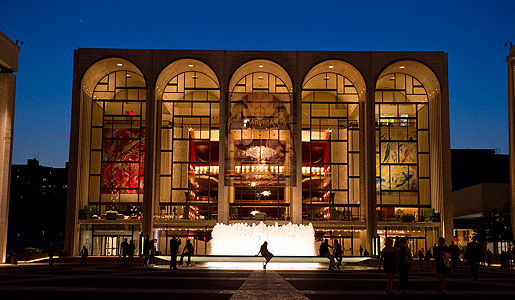Met and musician unions agree to share the pain
[UPDATE: On Tuesday the Met also reached an agreement with IATSE Local 1. According to a statement on the company’s website, “The new contract with Local One, subject to ratification, will provide the institution with savings comparable to those achieved through the recent agreements with Local 802 (which represents orchestra musicians and librarians) and AGMA (which represents chorus, principal singers, directors, and stage managers).”]
After a summer of vituperative discontent, the Metropolitan Opera managed to avoid potential disaster when the company’s management reached a tentative agreement with two of its largest unions on Monday.
The labor negotiations for fifteen Met unions played out in the public arena the past three months in unusually acrimonious fashion even for these kind of high-stakes contract battles, with charges and countercharges leveled from each side in press releases and public statements.
Most media attention was focused on the Met’s disagreement with the American Guild of Musical Artists (which represents the chorus, among others) and the local 802 union of the American Federation of Musicians (which represents the orchestra).
The resolution was announced early Monday morning, after negotiations stretched past management’s announced Sunday night lockout deadline and well into the following morning. Allison Beck, the federal mediator called in to assist in the proceedings, praised both sides in a statement on Monday: “We are grateful for their commitment to the collective bargaining process and grateful most of all that the Metropolitan Opera, one of the world’s premier cultural institutions, will continue providing outstanding operas for all to enjoy.”
As reported in The Wall Street Journal and The New York Times, the new four-year agreement would immediately cut pay to members of the two unions by 3.5 percent, increasing to a 7 percent cut after sixth months, with a possible pay increase of 3% in the fourth year. Management, meanwhile, agreed to find a matching $11.25 million in savings elsewhere in the budget.
The agreement would also provide bonuses and possible revenue sharing, should the Met’s revenues and investment returns surpass expectations. Eugene Keilin, a financial analyst who reviewed the company’s finances during the negotiations, will stay on to monitor the Met’s books and ensure that cuts are imposed equally on union pay and other management expenses.
The tentative contract represents a compromise between the parties’ initial hard-line positions. Peter Gelb, the Met’s general manager, had called for cuts to union pay and benefits of 16 to 17 percent, asserting that the company was on the brink of financial ruin due to a combination of a shrinking audience and ballooning labor costs. The unions countered that the necessary cuts should come out of the production budget, insisting that the new stagings unveiled during Gelb’s tenure have been grossly extravagant while failing to produce satisfactory attendance numbers.
This labor dispute has been among the most heated in the Met’s history and has received intense coverage in local and national media. Alan Gordon, AGMA’s national executive director, repeatedly attacked Gelb’s character and questioned his concern for the company’s artists both on social media and in a series of leaked emails to union members.
The Met has extended the deadline for other negotiations ongoing tonight. The company has still not reached agreements with a handful of its unions, including Local One of the International Alliance of Theatrical Stage Employees, which represents its stagehands. Last October, Local One organized a strike that forced the cancellation of Carnegie Hall’s opening night concert.







